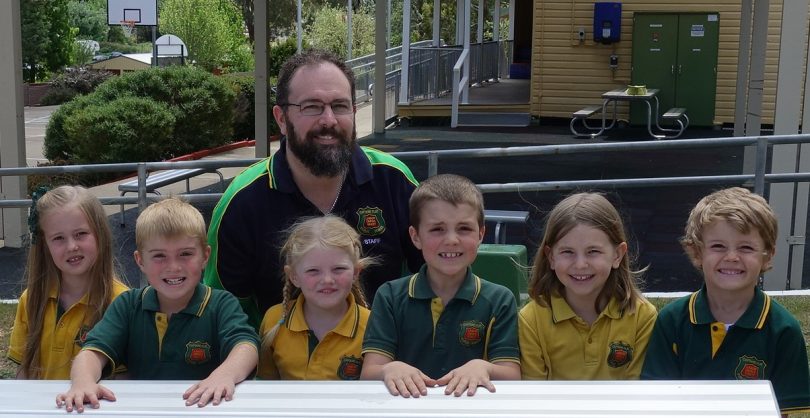
Principal Jason Marshall with students at Captains Flat Public School. Photo: Supplied.
A small rural primary school has turned to crowdfunding to help purchase a defibrillator for the school’s first-aid kit.
When new Principal Jason Marshall arrived at Captains Flat Public School, which is around 60 kilometres from Canberra, he noticed that there wasn’t a defibrillator available at short notice in the area.
Recognising the significant distance to the nearest emergency ward, the school’s P&C offered to raise money to buy the vital piece of equipment to ensure that in the worst-case scenarios the students can receive the help they might need.
“Our principal brought it to our attention a month ago because he wasn’t aware of any defibrillators in the town that would be easy enough to access if one of the kids had an emergency,” P&C treasurer Rebecca Scott said.
“There is a local defibrillator with our local SES station which is a drive from the school and there is one in the community health centre but it is only open one day a week.
“We called an ambulance out last term and it took 40 minutes to arrive, which is not an option during an emergency.”
In Australia, defibs are currently not mandatory in schools, sporting centres, workplaces or public buildings and the funding the school receives from the NSW Department of Education runs thin.
“Captains Flat is a really small community, and we have a rural school with very few children,” Ms Scott said. “The funding is based on the number of kids so we stretch the money as far as we can but things like defibrillators are not provided under the Department’s funding.
“So the P&C decided to fundraise to purchase one.”
A GoFundMe appeal was launched which has raised just over $2,000, thanks in part to a significant donation from a neighbour.
“My neighbour gave $1,000, which made me nearly fall off my chair,” she said with a laugh. “The rest of the donations have come in from grandparents or other student relatives. I have been really surprised and thrilled by the generosity.”
The defibrillator will also be available for the wider community if needed, with the lifesaving device to be installed on the school’s verandah so it is accessible to all.
“We want this to be accessible to the entire community to help anyone who needs it,” she said. “We are a really small community and want to look out for each other.”
Every year more than 30,000 Australians have a sudden cardiac arrest. Research shows that without a defibrillator there is around a six per cent chance of survival. The President of the Rural Doctors Association of Australia, Dr Adam Coltzau, is especially concerned about regional Australians living on properties more than 10 minutes from a hospital.
Last month, Dr Coltzau told Region Media that people’s chance of surviving sudden cardiac arrest depends on the speedy and continued delivery of CPR and early access to defibrillation.
For people living 10-20 minutes from the nearest hospital, the chances of surviving sudden cardiac arrest are less than 10 per cent and that chance will decrease by 10 per cent for every minute that goes by without CPR being administered.












